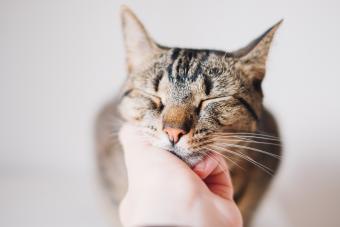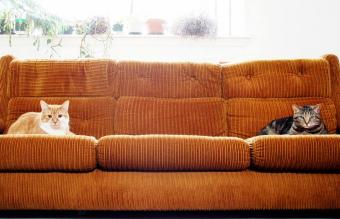
If you have ever seen a cat jump or fall, it might appear as though they always stick the landing. This raises the question, do cats always land on their feet? The answer is yes, but that doesn't guarantee they'll always land safely. Cats possess a natural righting reflex that allows them to twist their bodies mid-air to orient themselves, but whether they land without harm depends on the height from which they fall. Data collected by the Animal Medical Center of New York City suggests that cats suffer the most injuries when they fall between two and six stories, whereas falls between seven and 32 stories may give cats enough time to right themselves. However, there's more science behind how and why cats land on their feet.
What is Feline "Righting Reflex"?
A cat's righting reflex is an innate ability to twist their body and align themselves in order to land safely. Kittens as young as 3 weeks old begin practicing this maneuver and typically have it mastered by 7 weeks of age. Thanks to their highly flexible backbone and free-floating clavicle, all cats can do this.
When a cat falls, their body torques in such a way that the front half and back half rotate on different axis'. Intentional extending and tucking of their front and back legs contribute to this alignment. Once oriented, their body then relaxes and flattens, as if creating a parachute to glide down with.
When does this righting reflex kick in? Cats need to fall at least 30 centimeters or almost 12 inches in order to orient their bodies to fall on their feet. Any shorter, and they can injure themselves. But unfortunately, even greater heights can result in severe injury.
Supporting Studies and News
A study completed over five months by the Animal Medical Center of New York City reviewed 132 cases of high-rise syndrome. These cats were patients who presented to the veterinary hospital after falling from various heights, and ninety percent of these cats survived with treatment. Based on the results, they concluded that cats who fell from between two and six stories suffered the most significant injuries compared to those who fell from higher floors. Arguably the most impressive case was that of a kitten who fell 32 stories and was discharged from the hospital a few days later with only a collapsed lung and broken tooth.
Another miraculous story is that of a cat who launched themself from the fifth-floor window of a burning building in Chicago in 2021. Onlookers witnessed the cat safely fall to the grass and scamper off without any obvious signs of injury.
Why Do Cats Fall from High Places?

Cats don't necessarily take pleasure in flinging themselves from great heights, but they do enjoy perching. It's not uncommon to see an outdoor cat positioned on a tree branch or rooftop. Even domesticated indoor cats seek out high places on a cat tree or the top of the fridge. Cats instinctually prefer to have this high vantage point to watch for danger, and because cats like heights, falls naturally occur.
When cats fall, it's generally unintentional. Maybe a bird catches their eye and they momentarily lose balance, or their claws can't grip the surface properly. Regardless of the reason, if a cat falls from high up, even if they do land on their feet, they can injure themselves.
High Rise Syndrome in Cats
Unfortunately, cats fall from high places and sustain injuries so frequently experts gave the condition its own name: high-rise syndrome. High-rise syndrome refers to the injuries cats can suffer from after experiencing a fall. This occurs most commonly in the warmer months when windows and doors are open and in younger cats who are more inclined to explore. However, any cat can fall unexpectedly. Depending on the height of the fall, the surface the cat falls onto, and the position they are in when they make contact with the ground, a cat can experience any of the following injuries.
- Fractured hard palate
- Broken jaw or teeth
- Punctured or bruised lungs
- Broken limbs
- Soft tissue tears
- Head injuries
- Internal organ damage
- Death
What to Do if Your Cat Falls
If your cat falls, they may not show any outward signs of trauma, but that doesn't always mean they weren't injured. A fall from any height warrants a trip to the vet to confirm your cat is safe. Closely monitor your pet for 12 to 48 hours and seek veterinary care if they exhibit any of the following concerning symptoms.
- Panting
- Difficulty breathing
- Wounds or bleeding
- General lethargy
- Discomfort
- Inability or unwillingness to stand or walk
- Limping
- Difficulty eating or drinking
- Inability to urinate
- Abnormal eliminations
Treatment for high-rise syndrome varies based on the patient's injuries. Your veterinary ER will assess your cat's condition and may first treat them for shock with oxygen therapy, IV fluids, and pain medications. In addition to a physical exam, diagnostics such as x-rays and blood work are typically recommended to identify any internal injuries. Unfortunately, not all cats who fall from tall heights survive.
Tips to Prevent Cats from Falling
If you live in an apartment building or have a two or three-story house, it's important to take precautions to prevent high-rise syndrome.
- Keep your cat indoors to prevent them from climbing trees or buildings.
- Avoid trimming the claws on outdoor cats to give them traction if they do slip.
- Place secure screens on all windows or balcony doors.
- Do not allow your cat on the balcony unless it is completely enclosed.
- Create a balcony "catio" with a secure mesh screen or chicken wire.
Do Cats Always Land on Their Feet?
Cats are fascinating creatures that somehow appear to defy the rules of physics. Their righting reflex is a phenomenon that still irks many experts. While it's not safe or recommended to drop a cat to test the reflex, know that your feline friend has this special built-in protective mechanism. And if your cat does suffer a fall, seek veterinary care to ensure they haven't sustained any injuries for a positive outcome.







